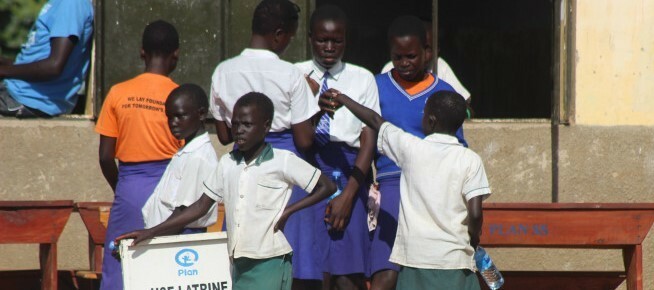Primary eight leavers in Lainya County of Central Equatoria State are demanding the government and development partners construct at least one mixed secondary school in the area to reduce the high rate of school dropouts in the county.
Loka Secondary School is the one higher institution of learning which was affected by the conflict in 2016. Local education officials and parents say with relative peace and stability in Lainya, there is a need for a secondary school so more children and school dropouts can go to school.
18-year-old Monica Keji who completed her Primary eight two years ago said the lack of secondary school in Lainya town made her drop out. Keji said the lack of access to secondary education has forced many girls into early marriage in the county.
“After finishing P8 and you don’t have a relative in Yei or Juba to stay with, we end up getting forced into early marriage and most of the girls are victims of early marriage because there are no secondary schools. I am calling on the government and development partners to construct for us secondary schools to reduce the rate of early marriage in Lainya town,” Keji explained.
Edward Ladu, another P8 leaver, said the lack of secondary school has grounded him home because his father cannot afford to sponsor his education outside Lainya County.
“We are calling on the government and NGOs to build a secondary school inside Lainya town so that parents who cannot afford to send their children outside can study in Lainya here,” he urged.
Tabu Yuasa, a student who finished her primary education last year, said: “Actually, we have many primary schools here, but the biggest challenge is that we don’t have secondary schools and many of the pupils who completed P8 find it difficult to continue with their studies and looking for where to study in Yei, Juba or Uganda is a problem and some parents cannot afford to sponsor their children to study outside Lainya, and this situation has made many children stay home without studies.”
Oliver Lomude, a parent of six children, said he cannot afford to send his children to secondary school. Lomude also reiterated calls for the construction of a secondary school inside Lainya Town.
“This situation is affecting parents because we don’t have enough money to send our children for further studies in Yei and Juba, and you see that as parents, we are traumatized because most of our P8 children are staying at home without enrolling in secondary schools here,” he said.
Festo Lucky Luate, Lainya County education director, confirmed that most primary leavers are challenged to pursue their studies due to the lack of secondary schools in the area.
He said the county government still lacks resources to construct another new secondary school.
Lucky said there is an improvement in school enrollment in primary schools this year compared to last year.
“In 2018, 2019, 2020, and 2021 we have several primary eight learners who sat for their primary leaving exams, and all passed, but the biggest concern is that there are no secondary schools here, and currently, we have over 3,000 learners studying in primary schools in 25 primary schools, and due to lack of secondary schools, some of them are just staying, and if more schools are constructed, more learners will be attracted to study here,” Lucky said.
For his part, Lainya County commissioner Emmanuel Khamis said the local government has restored peace and stability in the county and embarked on rehabilitation of health facilities but lacks resources to support the construction of secondary schools.
“Currently, most of the people are in Lainya here, and there are many primary schools here, and those from poor family backgrounds cannot afford to send their children to pursue secondary school studies and having a secondary school in Lainya town can help students here, and I am appealing to the development partners to build a secondary school for both boys and girls because currently many returnees have come back and there is high demand for a secondary school in Lainya town,” he said.
Lainya County is one of the counties in Central Equatoria badly affected by years of conflict.




